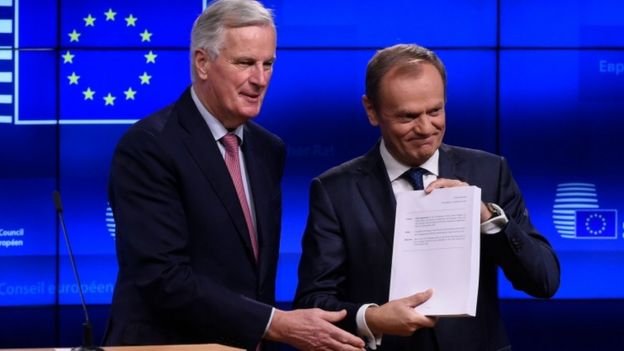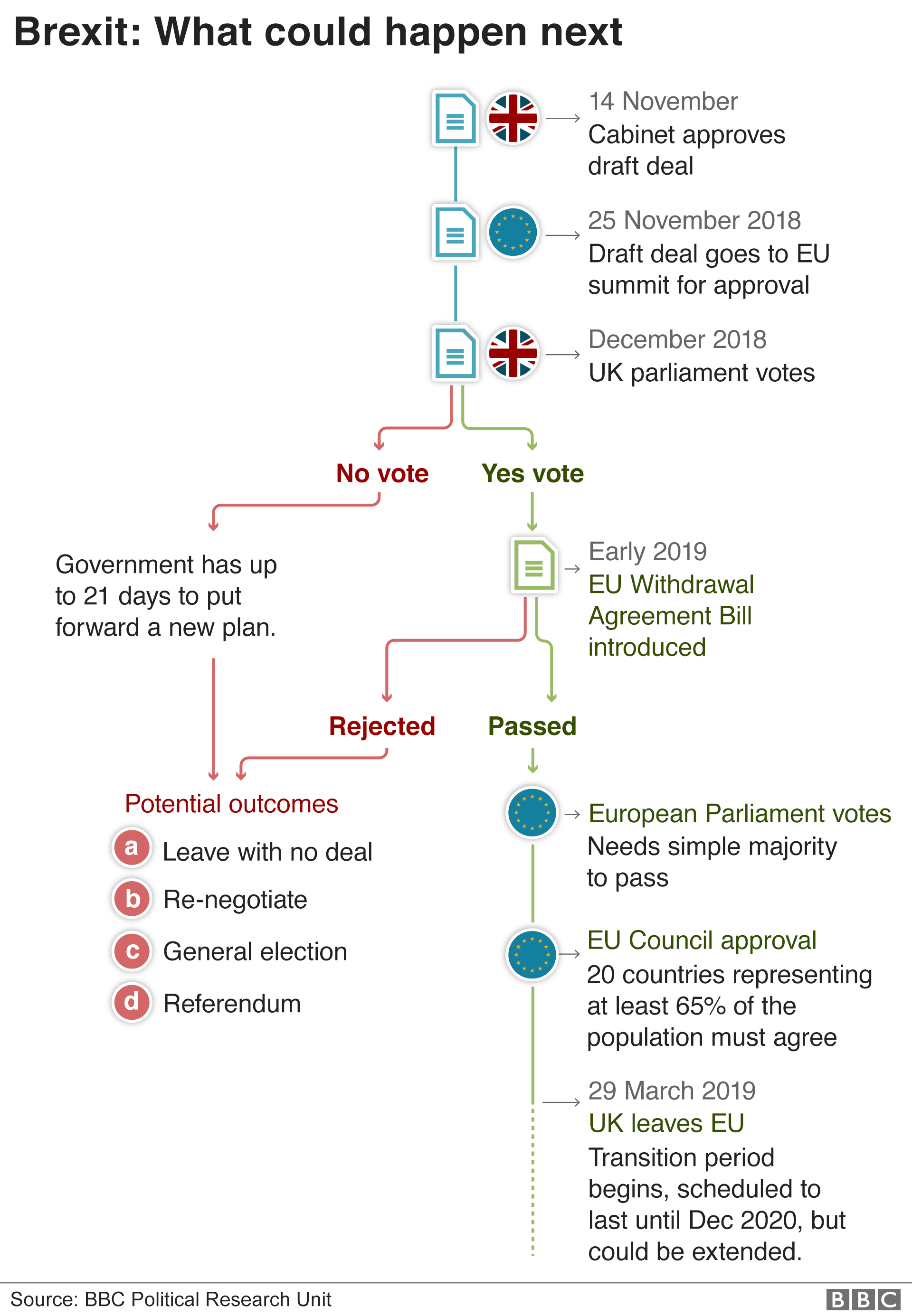Brexit: EU leaders dismiss talk of renegotiating draft agreement
EU leaders have dismissed talk of renegotiating the draft Brexit deal and warned the UK’s political situation could make a “no-deal” more likely.
German Chancellor Angela Merkel said there was “no question” of reopening talks as a document was “on the table”.
Meanwhile French PM Edouard Philippe said there was a need to prepare for a no-deal because of UK “uncertainty”.
The EU has set out a series of meetings leading up to 25 November when it plans to approve the Brexit agreement.
However leaders admit that there is still much ground to cover after the UK Prime Minister Theresa May won backing on Wednesday from her cabinet for the 585-page draft agreement.
“We still have a long road ahead of us on both sides,” the EU’s chief Brexit negotiator Michel Barnier said.
On Thursday, Mrs Merkel said she was pleased that progress had been made.
But following news of resignations from Mrs May’s cabinet, including the UK’s Brexit Secretary Dominic Raab, she said it was possible that Britain may still leave without a deal.
She also said that there was no appetite for further talks on possible amendments to the current agreement.
“We have a document on the table that Britain and the EU 27 have agreed to, so for me there is no question at the moment whether we negotiate further,” she said.
Mr Philippe appeared to echo her sentiment over UK political uncertainty.
“It will escape no-one that the current political situation in Britain could fuel uncertainty… over the ratification of the accord,” he said.
How have other European leaders reacted?
The European Parliament’s Brexit chief Guy Verhofstadt said the deal had been hammered out after two years of “intense negotiations” and he hoped UK MPs would accept that “there is not a lot of room [for] manoeuvre to say, ‘OK, let’s start again'”.
French Finance Minister Bruno Le Maire said the deal was “good news for the French economy” but also issued caution, saying the UK must be made to respect all EU rules.



Skilled swerve
Analysis by BBC Europe editor, Katya Adler
The EU knows there is a very real possibility the Brexit deal could be voted down by the UK Parliament in a few weeks’ time.
I put the question to Michel Barnier on Wednesday night at his press conference – but, skilled politician that he is, he refused to engage.
Brussels is very keen indeed not to give the impression that the EU might change or come up with a “better” Brexit deal text if this one ends up being rejected in the House of Commons.
Mr Barnier quoted Theresa May as saying that this is a deal in the UK’s interest.



Finland’s Prime Minister Juha Sipila tweeted to say that while Wednesday’s developments were important, “decisions on both sides are still needed for a final agreement”.
Austrian Chancellor Sebastian Kurz said he was “very pleased” and “optimistic”, adding: “We are pinning our hopes on it.”
What has the EU said and what happens next?
Speaking on Thursday alongside EU Council head Donald Tusk, Mr Barnier said the agreement was fair and balanced, took into account the UK’s needs and laid the ground for an “ambitious new partnership”.


Mr Tusk praised Mr Barnier’s work and said the agreement had “secured the interests of the 27 member states and EU as a whole”.
He laid out the timetable for the days ahead.
- EU member states will analyse the document and at the end of the week national envoys will share their assessments
- A political declaration on future ties between the EU and the UK will be agreed by Tuesday and members will have 48 hours to evaluate it
- The EU Council will then meet for a summit on 25 November to finalise the agreement “if nothing extraordinary happens”, Mr Tusk said. The leaders of the 27 EU nations must approve the deal
Mr Tusk said: “Since the very beginning, we have had no doubt that Brexit is a lose-lose situation, and that our negotiations are only about damage control.”
Addressing the UK, he added: “As much as I am sad to see you leave, I will do everything to make this farewell the least painful possible, for you and for us.”
Mr Barnier later took the document to the European Parliament. Its president, Antonio Tajani, said MEPs would vote on the deal in early 2019.
If the agreement is approved by both sides, a 21-month transition period will kick in, during which a trade deal and the thorny issue of how to ensure there is no physical border between Northern Ireland – part of the UK – and the Republic of Ireland will need to be worked out.
A smooth border-free exchange underpins the peace deal that ended the Northern Ireland conflict.


TOP IMAGE: copyright GETTY IMAGES






